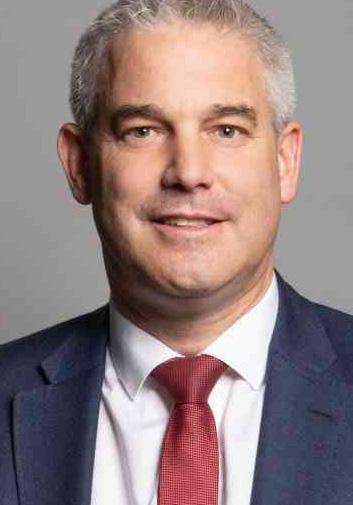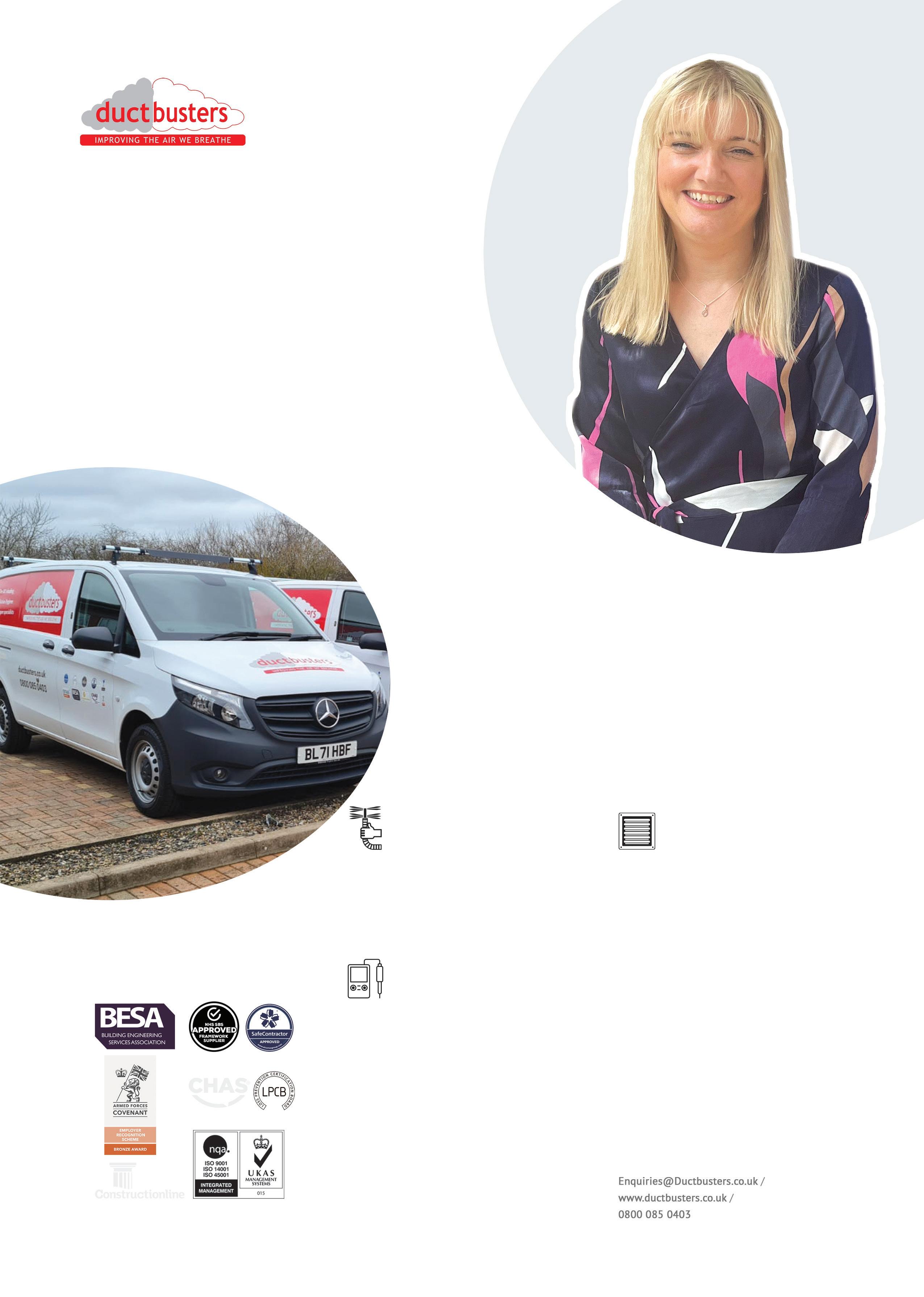
24 minute read
News
from Health Business 22.6
by PSI Media
Chancellor delivers Autumn Statement
Chancellor Jeremy Hunt has delivered his long-awaited Autumn Statement in the House of Commons.
Hunt began his speech by acknowledging that the UK is in a recession and that things will get worse before they improve.
Among the measures announced is a reduction in the threshold for when the highest earners start paying the top rate of tax, and a windfall tax on the energy industry.
Hunt has confirmed the government departments can expect a squeeze and that they will have to make “tough decisions to deal with inflationary pressures in the next two years”. He did say that overall spending on public services will rise for the next five years after accounting for inflation.
According to the chancellor, the health budget will be protected. However, he has called on the NHS to “join all public services in tackling waste and inefficiency. He said:
“That doesn’t mean asking people on the frontline to work harder, but rather asking challenging questions on how to reform all public services for the better.” Hunt has announced that the NHS budget will be increased by £3.3 billion in each of the next two years.
The chancellor also included an extra £1.5bn for the Scottish government, 31.2bn for the Welsh government and £650m for the Northern Ireland executive to tackle pressures on schools and the NHS.
NHS chief executive Amanda Pritchard has responded to the chancellor’s autumn statement. Pritchard said: “While I am under no illusions that NHS staff face very testing times ahead, particularly over winter, this settlement should provide sufficient funding for the NHS to fulfil its key priorities. As ever, we will act with determination to ensure every penny of investment delivers for patients.”
READ MORE
BACKLOG
Government sets up Elective Recovery Taskforce
The government is setting up an Elective Recovery Taskforce intended to help the NHS meet waiting list targets.
The aims are to eliminate 18-month waits by April 2023 and waits of over a year by March 2025.
The Taskforce will be chaired by Health Minister Will Quince and feature academics and experts from the NHS and independent sector to advise the government on ways to help the NHS recovery from the pandemic, and reduce waiting times.
The Taskforce will deliver a series of recommendations to the government early next year.
One topic of focus will be how the NHS can utilise existing capacity in the independent sector to cut the backlog.
Health and social care secretary Steve Barclay said: “The NHS is facing an unprecedented challenge to tackle covid backlogs.
“Hardworking staff have made strong progress but I want to turbocharge our current plans to bust the backlog and help patients get the treatment they need.
“The taskforce will look at sensible steps to utilise all existing capacity to slash waiting lists while ensuring the NHS always remains free at the point of use.”
Patients will also be able to access treatment and diagnostic tests closer to home, with the approval of 19 new one-stop shops for tests, checks and scans.
Diagnostic centres will be set up across the country including in football stadiums and shopping centres and will provide MRI, CT and x-rays. 91 centres are already in operation.
READ MORE HEALTH SECRETARY
Barclay speech puts focus on efficiency

Health and social care secretary Steve Barclay delivered a speech at the Spectator Health Summit in London.
Barclay began by highlighting the £6.6 billion of extra funding for the NHS over the next two years, as well as increased funding for social care that was announced in the Autumn Statement.
Barclay listed priorities including pandemic backlogs, operations, access to GPs, urgent and emergency care, ambulance handovers and delayed discharge.
Barclay put the focus on efficiency: “Now, efficiency within the NHS is often seen through the lens of finance.
“So, the case I want to make today is that efficiency is not just a finance priority – it’s a patient priority too.
“Because efficiency is an indicator of wider system health.”
He continued: “An efficient system addresses bottlenecks that delay patient care by designing new journeys for patients that avoid those delays.
“Because quicker – and therefore earlier treatment – will lead to better patient outcomes whether that is from earlier cancer diagnoses, with the announcement a couple of weeks ago on direct access for GPs, or on antibiotics – getting the right antibiotic first time, rather than the third or fourth time. Obviously bringing significant patient benefits, but it is also efficient in terms of cost.
“So an efficient system will get better treatment to the patient and improvement patient outcomes, but in doing so, it will also unlock value for money.”
The health secretary called for a move to more personalised care, with previous examples including at-home Covid tests and the Women’s Health Strategy.
He also urged senior clinicians to lead change and shared his pleasure that Professor Sir Tim Briggs has taken up the role of clinical lead for the Elective Recovery Programme.
Barclay called for innovation and technology to tackle challenges such as cancer and GP pressures.
He concluded his speech by saying: “Covid is still with us. And so in particular are its consequences, in the form of pandemic backlogs.
“So we must continue to embrace the pace and risk appetite of the pandemic when it comes to innovating at pace and at scale, and better assessing how risk is scored when we do so.
“That is what I believe the British people rightly expect us to do, and if we are to confront the scale of challenges facing the NHS, that is what we need to do.”
READ MORE

you are #morethananurse we are more than a recruiter.
You deserve to work with a team that can help you choose when you work, at the tap of a button.
One that can offer you a job searching experience that combines the power of technology, with that human touch. That is made up of specialist recruitment consultants who offer you more choice, more often.
Choose Randstad Nursing and let us be more than just your recruiter.
your career is at the heart of what we do.
We work by focusing on you: your career aims, goals, and needs. Our wide scope of experience and our large client base means that we can offer you temporary or fixed-term nursing jobs in both the NHS and private healthcare sector, nationwide and free of charge for you.
If you are ready to explore new career opportunities, pick up extra shifts, or simply have a conversation with our team, reach out today:


randstad.co.uk/nursing 0161 245 3633 apply@randstad.co.uk

randstad nursing.
Barclay sets out plans to amend NHS pension rules
Health secretary Steve Barclay has set out plans to amend NHS pension rules in order to retain more experienced NHS clinicians and remove barriers to staff returning from retirement.
The changes to pension rules will apply to all NHS staff, including senior doctors and are intended to support staff to remain in work for longer and boost the NHS workforce.
The changes include introducing flexibilities to allow retired and partially retired staff to return to work or increase their working hours without having payments to their pension reduced or suspended, meaning staff can claim a portion or all of their pension benefits but continue working and contributing to their pension.
Health and social secretary, Steve Barclay, said: “The generous NHS Pension Scheme is one of the best in the country, but it’s not working as it should for everyone.
“We need a system where our most experienced clinicians don’t feel they have to reduce their workload or take early retirement because of financial worries. I also want to make it easier for staff that want to return to work to support the NHS to be able to do so without penalties.
“These proposed changes will help open up extra appointments so patients can see their GP and consultants more quickly. With record numbers of doctors and nurses working in the NHS alongside record funding, I’m focused on giving people the security of knowing the NHS will be there for them when they need it.”
A consultation on the changes has been launched and will be open for eight weeks. Any changes are likely to be implemented in Spring 2023.
READ MORE
COVID
NHS marks two years since first Covid jab
The NHS has marked two years since the world’s first Covid jab by urging the public to get boosted before Christmas. 143 million doses of the vaccine have been delivered since the start of the campaign two years ago.
With cases rising again and more mixing over the festive period, the NHS is urging those eligible to come forward.
NHS chief executive Amanda Pritchard said: “The unparalleled success of the life-saving NHS Covid-19 vaccination programme, which began exactly two years ago when the NHS administered the first covid vaccine in the world outside a clinical trial, has been the single most important reason we have been able to get back to a pre-pandemic way of life.
“The determination and dedication of NHS staff and volunteers up and down the country to respond with extraordinary speed and precision to rollout the vaccine is something we can all look back on with great pride – delivering more than 143 million doses so far – and staff are continuing to give hundreds of thousands of covid and flu jabs every single day to protect us all from serious illness.
“The health service is currently facing huge pressure from all angles – and while covid may feel like a thing of the past – we continue to deal with thousands of covid hospitalisations as well as the resurgence of flu and other respiratory viruses. Just as it was two years ago, the best thing you can do to avoid serious illness and hospitalisation is to make sure you are up to date with your covid and flu jabs.”

£20 million is to be used for obesity, to trial how best to deliver new medicines and technologies for those living with obesity, particularly in deprived areas.
Finally, £30.5 million will be spent on addiction, to accelerate the development of new technologies to prevent deaths from overdoses.
Barclay said: “Conditions such as cancer and obesity prevent people leading long, healthy lives and cost the NHS billions of pounds every year.
“We’re leading the way in cutting-edge research which can find new ways to speed up diagnosis, enhance treatments and ensure a better quality of life for patients - both now and in the future.
“By harnessing the same spirit of innovation that delivered the vaccine rollout and working hand in hand with the NHS, industry and healthcare experts.
“We’re building a stronger, healthier NHS with record numbers of staff and record funding, to give people the security of knowing it will be there for them when they need it.”
READ MORE
PUBLIC HEALTH
Vaccine Taskforce model to be used to tackle health challenges
The government has announced a VaccineTaskforce-style approach to tackle public health challenges. £113 million will be used to fund research into four healthcare missions: cancer, obesity, mental health and addiction, with the aim to “unlock the next generation of medicines and diagnostics to save lives, transform patient care and ensure UK patients are the first to benefit from medical breakthroughs”.
The government said the Vaccine Taskforce model will be used to harness world-leading research expertise, remove unnecessary bureaucracy, and strengthen partnerships.
It is hoped that tackling these healthcare challenges can save the NHS money, with the estimated cost of obesity to the NHS currently at £6.1 billion a year.
The prime minister Rishi Sunak, health and social care secretary Steve Barclay and business secretary Grant Shapps will meet with industry figures including NHS leaders and industry experts at the Life Sciences Council to discuss delivering innovations and improving NHS efficiency.
Sunak said: “The NHS faces real pressures, which is why we are investing over £100 million in the technologies and medicines of the future to address some of the biggest public health challenges facing our country.
“This funding will improve outcomes for patients, ease existing pressures on the system and ensure that we are amongst the first to benefit from medical breakthroughs. Importantly it will also help save the NHS millions of pounds that could otherwise be spent on patient care - for example by tackling obesity which costs the health service over £6 billion annually.
“It is hugely welcome too that the highly successful Vaccine Taskforce, which procured millions of life-saving vaccines in record time during the pandemic, will now become a blueprint for how we harness the best talent and expertise from around the world and drive investment in research and development.” £22.5 million will be spent on cancer research to develop immune-based cancer therapies such as vaccines which are targeted to a specific cancer. £40.3 million will be invested in mental health to develop and introduce digital technologies, such as technology to monitor mental health at home. READ MORE
RCN launches new learning and development portal

The Royal College of Nursing has launched a new learning hub for the nursing profession.
RCN Learn enables access to quality-assured educational resources to support clinical and professional development.
The content sits behind a secure log-in. According to which category a person is in, they may have limited access to specific resources.
Registered users can access free core resources including standards and frameworks, while RCN members can access hundreds of clinical and non-clinical learning resources. NMC registrants can access a purpose-built tool to help build, store and track their evidence for revalidation quickly.
Paid-for resources include RCN Leadership programmes, RCN Infection Prevention and Control, RCN Leadership in Sustainability, the RCN Cultural Ambassador Programmes, RCN Leadership in Physical and Mental Health Outcomes, and RCNi products.
General secretary & chief executive Pat Cullen said: “This is an exciting new development in our commitment to providing the very best evidence-based learning resources for nursing staff.
“For nursing to keep advancing, the true potential in every one of us must be reached. RCN Learn will help support members to realise that potential and attain their career goals. I hope it will empower nursing staff to embed an education and learning culture within their care delivery.”
READ MORE
INTEGRATED CARE SYSTEMS
The government has announced an independent review of Integrated Care Systems (ICSs) to improve health outcomes across the country.
The review into oversight of ICSs intends to reduce disparities and boost efficiency, financial accountability and autonomy. It will explore how to empower local leaders to focus on improving outcomes for their populations.
Possible measures include giving local leaders more control and also making them more accountable for performance and spending. National targets will be reduced with an attempt to make the healthcare system more transparent.
The review is to be led by Patricia Hewitt, former health secretary and current chair of NHS Norfolk & Waveney Integrated Care Board.
As of 1 July, there are 42 ICSs across England.
Hewitt said: “I am delighted to have been asked to lead this review of how Integrated Care Systems can best be empowered and supported to succeed.
“By bringing together local government, the NHS and the voluntary, community and social enterprise sector, ICSs provide the biggest opportunity in a generation to improve health outcomes, transform health and care services and reduce health inequalities. Despite the many challenges we face, I am excited by how much has already been achieved in many different systems, including in Norfolk and Waveney, and optimistic about what our partnerships can do in future as we respond to the different needs of our own communities.
“This review will focus on how national policy and regulation can most effectively support and enable local systems to solve problems locally. It will build on the welcome work already done by NHS England to develop a new operating model.
“I look forward to working with colleagues from all 42 ICSs as well as DHSC, NHSE, colleagues in local government and others as we respond to the Health Secretary’s and the Chancellor’s invitation to help create a system of regulation and accountability based on the principle that change should be locally led and nationally enabled.”
Health and social care secretary Steve Barclay said: “I’m focused on supporting the health and care system through what we know will be a challenging winter but also crucially making the changes that will better prepare us for the future.
“Rather than a one-size-fits-all approach dictated from a ministerial office, local leaders are best placed to make decisions about their local populations and I want to empower them to find innovative solutions to tackle problems and improve care for patients.
“Fewer top-down national targets and greater transparency will help us deliver this aim and I am grateful to Patricia Hewitt for agreeing to lead this vital review to help us |get this right. I look forward to reviewing her findings.”

READ MORE DIGITAL TECHNOLOGY
Report highlights role of digital technologies in health workforce
According to a report by Health Education England, digital technologies will play a vital role in helping the NHS workforce cope with demands on the system in the future.
Demand for the NHS and social care workforce will continue to grow over the next decade and by maximising digital technologies, the transformation of workforce planning and supply, education and training, clinical decisionmaking and delivery of personalised healthcare services will be enabled.
The report expands on the legacy of the Topol Review, chaired by digital leader, cardiologist, and geneticist Professor Eric Topol, and looks further into how to ensure the health and care workforce is digitally ready for the future.
The report examines how digital technology is being used to develop a continuous learning environment and enable new ways of working. It also looks at how improved technology can help to organise health and care services and deliver them more efficiently.
The report also reveals that the use of digital technology will enable the NHS to widen access and participation for healthcare training and education, as well as promote diversity and inclusion.
Patrick Mitchell, director of innovation, digital and transformation at Health Education England said: “This report highlights how HEE’s approach to using current and emerging innovative technologies in educating and training future and current health professionals.
READ MORE

Earlier this year, Radar Healthcare launched its new podcast, What the HealthTech? The podcast, aimed at health and social care professionals, provides a platform for staying upto-date on the industry’s latest topics, challenges, ideas and innovation. With a new episode out every Thursday, What the HealthTech? hosts a diverse range of well-known guest speakers in health and social care, engaging in open and honest conversations about some of the most important issues. Topics covered in the 32 episodes so far have included: Bridging the gender gap, Learning from Patient Safety Events, Mental Health Awareness, Learning from Tragedy and Caring about Care. This wide range of topics has already drawn guests from all over the UK, including Peter Walsh from AvMA (Actions Against Medical Accidents), Lee Davies and Lottie Moore from Public Policy Projects, Judy Walker from iTS Leadership, and many others, all of whom are doing outstanding work in health and social care. The vision for the podcast came from Radar Healthcare’s head of marketing, Hayley Levene, who wanted to connect with audiences in a different way and create a space for healthcare professionals to be open and have honest conversations. “I wanted to inspire people with what we do, because we’re a company that is inspirational, our product is different, and our people are different,” Hayley said of the inspiration, which grew out of a passion for Steven Bartlett’s podcast “Diary of a CEO.” Only eight months since the launch, What The HealthTech? has attracted over 1400 listeners, 900 downloads and nearly 2,000 views on YouTube. One of the most popular episodes is ‘The Road to Patient Safety,’ with Marcos Manhaes of NHS Improvement and Paul Ewers of Milton Keynes University Hospitals NHS Trust about the journey from NRLS to LFPSE and the future benefits for the NHS. With some fantastic guests and topics on the horizon, What the HealthTech? is one to watch in 2023 - you can listen on all major podcast platforms or on the Radar Healthcare YouTube channel. Watch the most recent episode here.
Want to be a guest? Reach out!
Are you a health or social care worker who wants your voice to be heard, or an organisation that wants to talk about the work you’re doing? Radar Healthcare would love to hear from you – get in touch by emailing whatthehealthtech@ radarhealthcare.com
Visit www.radarhealthcare.com to learn more about Radar Healthcare and how they can help you make a difference.
UKHSA expresses concern over low vaccination rate of 2 to 3 year olds
The UK Health Security Agency (UKHSA) has published data on the take up of the flu vaccine among two to three year olds, and expressed concern at the low vaccination rates and the high rates of under fives hospitalised with flu.
According to the data, between 14 and 20 November, it is estimated that 200 children under five were hospitalised with serious complications caused by flu. Hospitalisation rates for flu are highest in the under fives.
The uptake of the flu vaccine is 30.9 per cent among two year olds and 32.9 per cent among 3 year olds. This rate has dropped by around 11 per cent compared to the last two years.
The UKHSA said: “Flu is now circulating at higher levels than recent winter seasons and young children are particularly vulnerable and can become seriously unwell. Due to coronavirus (COVID-19) restrictions in the past couple of years most young children will not have ever encountered flu. This means they will not have built up any natural immunity to this virus, so it is particularly important for them to take up the flu vaccine this year.”
GP practices are inviting those aged two and three for the nasal spray vaccination. Those who haven’t heard from their practice should contact them directly to make an appointment.
All primary school children and some secondary school children are also eligible for the nasal spray vaccine, which is usually given at school.
Dr Conall Watson, Consultant Epidemiologist at UKHSA, said: “Young children are particularly vulnerable to becoming very poorly

CANCER
Redesign of lung cancer services in Scotland
A £3 million investment has been announced for accelerated treatment for lung cancer in Scotland, with new diagnostic services to ensure patients receive faster access to treatment.
Lung cancer is the most common cancer in Scotland.
It is hoped the new services will ensure a faster process, reduce patient anxiety, reduce the risk of the cancer growing or spreading and reduce the risk of patients being unfit for effective treatment.
The new services will set timeframes for each step, with diagnosis set for 21 days after referral and treatment for most set at day 42.
Health boards will receive funding to realign services, so patients can receive multiple tests at the same time and reduce their trips to hospital.
Led by the Centre for Sustainable Delivery, the nationally developed lung cancer pathway is the first to be developed in Scotland. It will be funded by the Scottish Government’s Detect Cancer Earlier Programme.
Health Secretary Humza Yousaf said: “Lung cancer is the most common cancer in Scotland with around 5,500 cases diagnosed each year. The number of new cases is predicted to increase by 29 per cent for women and 12 per cent for men by 2027. That’s why we have to do as much as we can to tackle this disease.
“This redesign means faster and more efficient treatment for lung cancer patients. Even in advanced disease, newer treatments have improved patient outcomes but are highly dependent upon the patient remaining fit enough to receive those treatments.”
READ MORE GENOMICS
from flu. For the third week running we have seen hospitalisation rates among children under 5 jump up, with a 70 per cent increase in just the last week. Over 200 children were hospitalised because of flu in one week.
“Flu is now circulating at higher levels than recent years and because of the pandemic restrictions most young children will not have encountered flu before. This means they will have no natural immunity and are therefore at even greater risk this year.
“Two and 3 year olds can get protection with a free nasal spray vaccine from the NHS. Nobody wants their child to get sick so I strongly urge parents to book the vaccine at their GP surgery as soon as possible.”
READ MORE

The government has announced a £175 million fund for genomics research intended to save lives and improve health outcomes. £105 million will be spent on a research study lead by Genomics England in partnership with the NHS. The study will explore the effectiveness of using whole genome sequencing to find and treat rare genetic diseases in newborn babies.
The Newborn Genomes Programme is intended to support vital healthcare research to enable better diagnostics and treatments to be developed and explore the potential benefits of safely and securely storing a patient’s genome on record to help predict, diagnose and treat future illnesses through their lifetime. The current NHS heel prick blood test is used to detect nine health conditions in babies, but it is believed genome sequencing can detect hundreds more. £26 million will be spent on a cancer programme to evaluate genomic sequencing technology to improve the accuracy and speed of diagnosis for cancer patients and use artificial intelligence to analyse a person’s DNA, alongside other information such as routine scans.
There will also be £22 million for a programme to sequence the genomes of up to 25,000 research participants of non-European ancestry, who are under-represented in genomic research to improve understanding of DNA and its impact on health outcomes. The intention is to reduce health inequalities and improve patient outcomes.
Health and social care secretary Steve Barclay said: “We’ve made advancements in so many areas to improve people’s health – from ensuring ground-breaking new medicines get to patients faster to bolstering the NHS workforce to ensure we have record numbers - and this plan, backed by £175 million, sets out how we will use the latest genomic technology to go further.
“The potential for genomics to revolutionise the way we deliver health care is great – if we can detect treatable illnesses earlier and ensure patients access potentially lifesaving treatment faster, we could improve people’s lives across the county, including thousands of babies through this new pilot.
“The NHS is a world leader in genomics and by investing in this cutting-edge research we’re cementing our status as a life sciences superpower.”
READ MORE

































